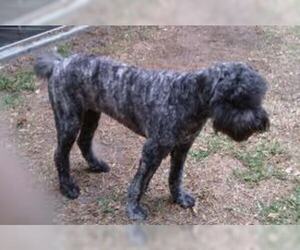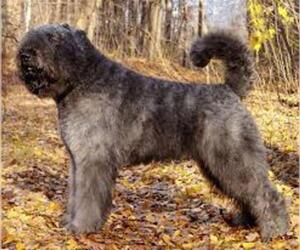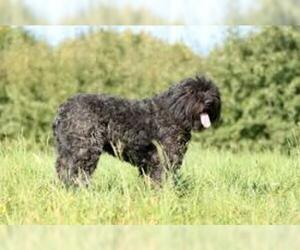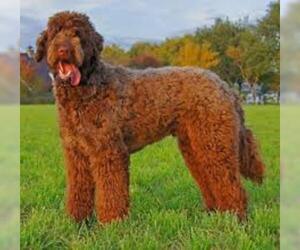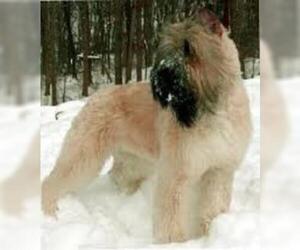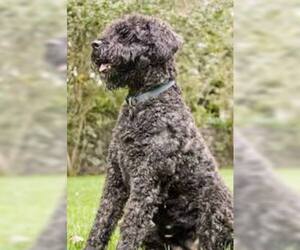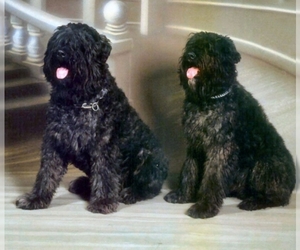
All about Bouvier Des Flandres dog breed
A.K.A. :Flanders Cattle Dog, Flanders Cow Dog, Flemish Bouvier, Bouvier, Toucheur de Boeuf, Koehond, Vuilbaard, Vlaamse Koehond, Belgian Drover, Flandres Bouvier, French Cattle Dog, French Bouvier, Bouvi, BDV
Size
Grooming requirements
Exercise requirements
Good with other dogs
Watchdog ability
Energetic
Training requirements
Playful
Affectionate
Good with other pets
Good with children
Good with strangers
Winter
Summer
Healthiness
Protective
Life Span
| Pure Breeds | Member |
| Breeds A - Z | B |
| Breeds by Group | Herding Working |
| Breeds by Trait | Good With Kids High Stamina Dog Breeds Hypoallergenic Low Shedding Smartest Dog Breeds |
| Overview: | The Bouvier des Flandres, originating from the Flemish region of Belgium and France, is a powerful and agile herding dog, historically used for cattle and sheep. Physically, they are large, rugged dogs with a distinctive rough, shaggy coat, typically fawn, black, or brindled, and a sturdy, compact build. Their expression is often described as intelligent and watchful. Temperamentally, Bouviers are known for being calm, courageous, and loyal, making them excellent, protective family companions. They are generally good with children when properly socialized, but their size and strength mean they require consistent training and firm, yet gentle, handling. While adaptable, their exercise needs and grooming requirements for their double coat mean they are generally not ideal for apartment living and thrive in homes with a yard and active families. Owners should be aware of potential health concerns such as hip and elbow dysplasia, as well as bloat, common in many large breeds. |
F.A.Q.
All You Need to Know About the Bouvier Des Flandres Breed
The Bouvier Des Flandres, originating from the rugged farmlands of Flanders, is a powerful and intelligent herding dog, making them exceptional companions for experienced owners. Known for their striking shaggy coat and imposing stature, these gentle giants possess a calm and loyal temperament, often described as "noble." They are generally good with children and other pets when properly socialized, though their size makes apartment living challenging without ample exercise. Their thick, double coat requires regular grooming – at least weekly brushing and professional trimming every few months – to prevent matting. Bouviers need significant daily exercise, including walks and playtime, to maintain their physical and mental well-being. Common health considerations include hip and elbow dysplasia, as well as bloat. With consistent training and a loving environment, the Bouvier Des Flandres can be a devoted and protective family member, offering unwavering loyalty and a commanding presence.The average weight for an adult Bouvier Des Flandres typically ranges from 70 to 110 pounds. There's a noticeable size difference between sexes:
- Male Bouvier Des Flandres weight: Generally falls between 80-110 pounds.
- Female Bouvier Des Flandres weight: Typically ranges from 70-90 pounds.
Bouvier Des Flandres Height: What's the Average Size?
If you're wondering, "How tall is a Bouvier Des Flandres?" you've come to the right place! These majestic dogs are known for their sturdy build and impressive stature. When measured at the shoulder, the average height of a Bouvier Des Flandres typically falls within a specific range, with some slight variations.For adult Bouvier Des Flandres, the typical height range is:- Males: 23.5 to 27.5 inches (approximately 60 to 70 cm)
- Females: 22.5 to 26.5 inches (approximately 57 to 67 cm)
The Bouvier Des Flandres colors primarily include fawn, black, gray, and brindle. The AKC recognized Bouvier Des Flandres colors are fawn (ranging from light to dark), gray (including salt-and-pepper), and brindle (stripes of dark hair on a lighter background). Black is also an accepted color, though less common than the other three. While these are the standard and most desirable Bouvier Des Flandres coat types, some rare coat types and exotic Bouvier Des Flandres variations can appear. These rare Bouvier Des Flandres colors include cream and white, though solid white is generally considered a fault in the show ring. You won't typically find blue, lilac, merle, or chocolate Bouvier Des Flandres, as these genetic color variations are not characteristic of the breed and are not recognized by major kennel clubs like the AKC. Potential adopters or buyers should focus on the accepted fawn, gray, brindle, and black for standard breed characteristics and pricing.
The Bouvier Des Flandres boasts a calm, courageous, and highly intelligent personality. Known for their unwavering loyalty to their families, they are protective yet not overly aggressive. While not typically overtly friendly with strangers initially, a well-socialized Bouvier Des Flandres will be polite and observant. They thrive on being part of the family and can be quite affectionate with their loved ones.Regarding apartment living, their moderate exercise needs and calm indoor demeanor *can* make it feasible, but they absolutely require consistent outdoor exercise and mental stimulation to prevent boredom and destructive behaviors. A house with a yard is generally preferred.With children, a well-raised and socialized Bouvier Des Flandres is typically patient and protective, but due to their size and strength, supervision is always recommended, especially with very young children. Their herding instincts can sometimes manifest as "nudging" or "corralling" children.When it comes to other pets, early and thorough socialization is key. They can coexist peacefully with other dogs and cats if introduced properly and raised together. However, their strong prey drive can make them a challenge with smaller, unfamiliar animals without careful management. The overall temperament of the Bouvier Des Flandres is that of a devoted, watchful companion who requires a confident and consistent owner.
Bouvier Des Flandres Temperament: A Loyal and Protective CompanionThe Bouvier Des Flandres temperament is characterized by a noble, calm, and intelligent disposition, making them a devoted family protector. These dogs are inherently loyal and form strong bonds with their families, often shadowing their favorite people. While not overtly demonstrative, their affection is deep and unwavering.Regarding friendliness and sociability, Bouviers are generally reserved with strangers, a natural extension of their protective instincts. Early and consistent socialization is crucial to ensure they are well-adjusted and comfortable in various situations, preventing undue shyness or suspicion. Once they accept someone, they can be quite genial.Adaptability to apartment living is generally not ideal for the Bouvier. They are large, active dogs who thrive with a yard and daily exercise. While they can adapt to smaller spaces with sufficient outdoor activity, a house with a secure yard is much preferred for their physical and mental well-being.Their behavior with children is typically excellent. Bouviers are known for being patient and gentle with the children in their own family, often acting as their watchful guardians. However, due to their size, supervision is always recommended with very young children to prevent accidental bumps. When it comes to other pets, Bouviers can coexist peacefully if raised with them from a young age and properly socialized. Their strong prey drive means careful introductions and continued monitoring are important, especially with smaller animals.Bouviers can exhibit a degree of stubbornness, a common trait in intelligent working breeds. They require a confident, consistent, and positive training approach. They are not a breed for timid owners. Despite their strong will, they are also quite sensitive to their owner's tone and mood, responding best to gentle guidance rather than harsh corrections. They thrive on having a "job" to do, whether it's obedience, agility, or simply being a vigilant family member. Overall, the Bouvier is a magnificent, intelligent, and protective companion dog for the right owner who appreciates their unique personality traits and can meet their needs for training, socialization, and activity.
Bouvier Des Flandres Care: Essential Daily Maintenance for a Healthy, Happy Companion
Bouvier Des Flandres care involves consistent daily maintenance to ensure their well-being. This breed, despite its size, is often described as a low-energy dog breed indoors, but requires moderate outdoor exercise to prevent boredom and maintain muscle tone.Grooming Needs: The Bouvier's thick, double coat demands regular attention. Expect brushing 2-3 times weekly to prevent matting and remove loose hair. Professional grooming every 6-8 weeks for stripping or clipping is also essential. Focus on the beard and mustache, which can collect food and moisture.Exercise: Daily walks (30-60 minutes) and playtime are sufficient. They enjoy activities like hiking and can excel in dog sports like agility and obedience.Dietary Considerations: Feed a high-quality dog food appropriate for large breeds with moderate energy levels. Monitor portion sizes closely to prevent obesity, a common issue in Bouviers. Consult your vet for specific dietary recommendations.Wrinkle and Ear Cleaning: While not heavily wrinkled, check any folds for moisture and debris. Their floppy ears are prone to infections, so clean them weekly with a vet-approved solution to prevent ear issues.Climate Sensitivity (Brachycephalic Anatomy): Although not a true brachycephalic breed, their heavier build and dense coat make them sensitive to heat. Avoid strenuous exercise during hot weather and always provide fresh water and shade. They thrive in cooler climates.Common Health Concerns & Health Tips for Bouvier Des Flandres: Be vigilant for skin issues due to their dense coat and potential allergies. Regular dental care, including brushing, is crucial to prevent periodontal disease. Weight management is paramount; obesity exacerbates joint problems and reduces overall lifespan. Other concerns include hip and elbow dysplasia, bloat, and eye conditions. Regular veterinary check-ups are vital for early detection and preventative care.The Bouvier Des Flandres activity level is moderate. These intelligent working dogs possess a unique balance, enjoying short bursts of intense activity followed by periods of calm rest. They are not hyperactive but do require consistent daily exercise to maintain their physical and mental well-being. Typical Bouvier Des Flandres exercise needs include a good daily walk, active playtime in a secure yard, or engaging in dog sports like obedience, agility, or herding. They enjoy interactive play with their families, such as fetch or tug-of-war, and appreciate mental stimulation through training or puzzle toys.
It's important to note their brachycephalic (short-nosed) anatomy. While not as pronounced as some other breeds, this can limit their strenuous activity in hot or humid weather. Care must be taken to prevent overheating during exercise. How active are Bouvier Des Flandres? They are suitable for active families who can provide regular engagement and outdoor activity, but they are generally not ideal for extremely high-energy, constantly on-the-go households who expect a dog to run for miles every day. Conversely, they are too active for low-energy households that cannot commit to daily exercise and mental enrichment. They thrive when they have a job to do or a purpose, which can be as simple as being a watchful family companion.Breed Breakdown: What Experts Say About the Bouvier Des Flandres
I would rate the "Size" trait of the Bouvier Des Flandres as an 8.This breed is undeniably large and substantial. Males typically stand between 23.5 and 27.5 inches at the shoulder and can weigh anywhere from 75 to 110 pounds, with females slightly smaller but still very robust. Their powerful, muscular build and dense bone structure contribute to their imposing physical presence. When compared to the vast majority of companion dogs, the Bouvier clearly falls into the "large" to "very large" category. You wouldn't mistake them for a Labrador, and they dwarf breeds like Beagles or even Standard Poodles.Given their significant size and the space they naturally occupy, the Bouvier Des Flandres is not best suited for apartment living or households with severe space constraints. While they are relatively calm indoors once mature, their sheer physical dimensions mean they need room to stretch out, turn around, and simply exist without constantly bumping into things. Frequent travel, especially by air, could also be challenging and expensive due to their size often requiring them to be crated in cargo. They thrive in homes with ample indoor space and, ideally, a securely fenced yard where they can exercise and patrol.
I would rate the Bouvier des Flandres' grooming requirements at a 7.While not the most extreme, the Bouvier's double coat is undeniably high-maintenance. It sheds minimally but requires frequent, thorough brushing, ideally several times a week, to prevent matting, especially the dense undercoat and longer outer coat. Regular stripping or professional grooming every 6-8 weeks is essential to maintain the coat's texture and health, a process that is more involved than a simple trim. Their long facial hair also necessitates daily cleaning to prevent food and moisture buildup. While they don't typically have deep skin folds, their dense coat can trap moisture, making them somewhat susceptible to skin issues if not properly dried and brushed. Ear cleaning should be done regularly due to their drop ears, and nail trimming is crucial as with any large breed. Compared to a short-coated breed, a Bouvier requires significant, consistent effort to keep their coat healthy and tangle-free, often necessitating specialized tools and techniques, making them far from an easy-care dog.
I would rate the Bouvier des Flandres' exercise requirements a 7.While not in the extreme "marathon runner" category, Bouviers are a robust working breed with significant energy and a strong need for physical and mental activity. They thrive on structured routines that include daily, moderate to long walks (at least 60-90 minutes, often split), and ideally, opportunities for more vigorous exercise like off-leash running in a secure area, hiking, or even engaging in dog sports like agility, obedience, or carting. Their intelligence means mental stimulation is equally important, so simple backyard playtime might not be enough to keep them satisfied without additional enrichment. They have good stamina and are built for sustained movement, but their dense coats and potential for heat sensitivity (though not brachycephalic, they can overheat) mean exercise in hot weather needs to be carefully managed. They are not a breed that will be content with a quick stroll around the block; lack of adequate exercise can lead to boredom, destructive behaviors, and even health issues.
I'd rate the Bouvier Des Flandres' "Watchdog Ability" at a 7 out of 10.The Bouvier is an excellent household watchdog, particularly known for their imposing presence and deep, resonant bark. They are highly alert to their surroundings and quick to notice anything out of the ordinary, whether it's an unfamiliar sound or a person approaching their property. Their territorial instincts are strong, and they take their role as guardians seriously, often positioning themselves to observe and control their environment. While not typically aggressive without reason, their sheer size and protective nature mean they are more than capable of providing meaningful early warnings and acting as a deterrent to potential intruders. They will certainly let you know if someone is at the door or if something isn't right, often with a sustained and powerful bark. They aren't just passive companions; they are actively engaged in monitoring their home and family.
I would rate the Bouvier des Flandres' "Good with Other Dogs" trait as a 5.While not inherently aggressive, the Bouvier des Flandres typically falls into a category of being reserved and watchful rather than overtly dog-friendly. They possess a strong guarding instinct and can be discerning, which often translates to a "wait and see" approach with unfamiliar dogs. Their herding background means they might attempt to "control" other dogs, especially those with high energy, which can be misconstrued as dominance or annoyance by less confident canines. Compatibility with dogs of different sizes and energy levels varies greatly; a well-socialized Bouvier might tolerate a calm, smaller dog, but a boisterous or challenging peer could trigger their protective or dominant tendencies.They absolutely require careful and consistent socialization from a young age to foster peaceful coexistence. Without it, the potential for reactive behavior, particularly towards same-sex dogs or those they perceive as a threat to their family or territory, increases significantly. While they can adapt to multi-dog households, especially if raised together, it often requires careful introductions, ongoing training, and clear pack leadership from their human. They don't typically "thrive" in canine company in the way a Labrador might; rather, they can learn to coexist peacefully with appropriate management and training, often preferring the company of their human family above all else. This breed needs careful introductions and training to coexist peacefully, rather than naturally being extremely sociable.
I'd rate the Bouvier Des Flandres' "Energetic" trait a 6 out of 10.While not a hyperactive breed, the Bouvier possesses a good deal of stamina and a need for regular exercise. They are naturally active and were historically bred for herding and guarding, roles that demand endurance and mental engagement. This translates to a dog that enjoys and benefits from long walks, moderate jogs, and engaging playtime. They can be quite playful, especially as puppies and young adults, and often enjoy participating in activities like agility, obedience, or even competitive herding. They certainly aren't a couch potato and will become bored and potentially destructive if their need for physical and mental stimulation isn't met. However, they are generally not as relentlessly energetic as some other working or sporting breeds (e.g., Border Collies, Jack Russell Terriers). They are also not a truly laid-back breed; while they can settle indoors after sufficient exercise, they won't be content with minimal activity.Regarding their brachycephalic anatomy, it's important to note that the Bouvier Des Flandres is *not* a brachycephalic breed. They have a moderately long muzzle, not a shortened one. Therefore, their "brachycephalic anatomy" does not negatively affect their stamina and exercise tolerance in the way it would for breeds like Pugs or Bulldogs. Their respiratory system is generally robust, allowing them to engage in sustained activity without the breathing difficulties associated with true brachycephaly.
I would rate the training requirements of the Bouvier des Flandres at a 7.While intelligent and capable of learning a great deal, the Bouvier is also known for a strong will and a degree of stubbornness. They are not the type of dog that will simply acquiesce to commands without understanding the "why" or if they perceive a lack of confidence from their handler. Their attention span can be good when engaged, but they can also become easily bored with repetitive drills. Responsiveness to commands will be directly correlated to the consistency and clarity of the training they receive. Positive reinforcement is highly effective, as they thrive on praise and connection with their owner, but it needs to be paired with firm, fair, and consistent boundaries. This breed is generally not beginner-friendly and typically requires an experienced owner who understands canine psychology, can provide structured routines, and is prepared to be consistent and patient. Without proper socialization and training from a young age, they can become quite difficult to manage due to their protective instincts and independent nature.
I would rate the Bouvier des Flandres' "Playful" trait a 6 out of 10. While not as overtly boisterous as some retriever breeds, they are far from inactive. Bouviers possess a moderate, often surprising, playfulness that emerges once they've bonded with their family. They generally enjoy interactive games like fetch or tug, especially if it involves a job or a purpose. Their enthusiasm for toys can vary, but a good game often sparks their interest. They aren't typically "in your face" attention seekers in a playful manner, but they do appreciate and respond well to an invitation to play. Compared to many companion dogs, they are more laid-back initially, but they aren't averse to fun and can be quite spirited once comfortable and engaged. Their playfulness often has a serious, working-dog undertone, rather than a purely frivolous one.
I would rate the Affectionate trait of the Bouvier Des Flandres as a 7.Bouviers are deeply loyal and form strong bonds with their families, demonstrating a clear desire for human companionship. They are sensitive to their owner's emotions and will often try to "help" or offer a comforting presence. Their tendency to follow family members around the house is a testament to their desire to be near you. While they aren't typically excessive "cuddlers" or "lap dogs" in the way some smaller breeds might be – they are large, after all – they certainly appreciate and seek out physical closeness, often leaning against you or enjoying a good scratch. They thrive on being an integral part of the family and their affection is demonstrated through their protective instincts and unwavering devotion, rather than constant, overt displays. They are more independent than some companion breeds that live for constant attention, but their love is undeniably profound and steadfast.
I would rate the "Good with Other Pets" trait of the Bouvier Des Flandres a 6 out of 10.While not inherently aggressive towards other animals, the Bouvier's strong protective instincts and potential for a higher prey drive, particularly towards smaller, faster-moving creatures like cats, mean they aren't naturally extremely pet-friendly without effort. They are a working breed bred to guard livestock, and this protective nature can translate to resource guarding with other pets if not managed. However, with early and consistent socialization from a young age, coupled with firm and positive training, Bouviers can learn to coexist peacefully with other dogs and even cats in a multi-pet household. They are intelligent and capable of learning appropriate behavior, but it requires a dedicated owner to guide them. Without this training and supervision, their natural guarding tendencies and prey drive can make them less compatible with other animals.
The Bouvier Des Flandres scores a strong 8 out of 10 for "Good with Children." They are naturally calm, patient, and surprisingly gentle for their size, making them excellent companions for respectful children. Their protective instincts, when properly channeled through training and socialization, translate into a watchful guardian for their young family members. While not overly boisterous, they can be playful and enjoy interactive games. They generally tolerate the noise and occasional clumsiness of children well, thanks to their stable temperament. However, due to their size and power, supervision is always recommended with very young children to prevent accidental tumbles, and early training is crucial to ensure they understand their role and boundaries within the family. They thrive in a family setting where they receive consistent guidance and are integrated as valued members, rather than left unsupervised with kids.
I would rate the Bouvier Des Flandres' "Good with Strangers" trait as a 5.While not inherently aggressive, Bouviers are a reserved and naturally protective breed. They are not typically the type of dog to enthusiastically greet every stranger they encounter. Instead, their default behavior is often one of watchful observation. They will usually tolerate strangers in their owner's presence, but they rarely display overt friendliness or effusiveness. They are highly intelligent and bond strongly with their families, which can translate to a cautious demeanor around those outside their inner circle. They are more likely to bark or display guarding behaviors if they perceive a threat or if strangers approach them or their family abruptly. While proper socialization from a young age is crucial to ensure they are comfortable and well-behaved in public or around guests, it's important to understand that even with excellent training, a Bouvier is unlikely to transform into an "everyone's best friend" type of dog. They require consistent, positive exposure to be comfortable with unfamiliar adults, and their natural protective instincts will always be a part of their temperament.
The Bouvier Des Flandres would be rated a 7 for winter tolerance.While they possess a thick, double coat that provides excellent insulation and a robust, muscular build that contributes to their hardiness, they aren't quite a "10" for extreme cold. Their coat, while dense, is not as long and profuse as some northern breeds, and while they have good body fat, it's not excessive. Their large size helps them retain heat, but their non-brachycephalic anatomy (though not extremely long-nosed) doesn't put them at a disadvantage for breathing in cold air. They generally enjoy being outdoors and can safely participate in winter activities for extended periods in moderate to cold climates without excessive risk of hypothermia.Compared to many other companion dogs, the Bouvier Des Flandres requires less special care during winter months. While no dog should be left unsupervised in extreme cold for prolonged periods, a healthy Bouvier can comfortably tolerate and even thrive in cold weather that would send shorter-coated or smaller breeds shivering indoors. Owners should still be mindful of very icy conditions, potential frostbite on paw pads, and ensuring they have a warm, dry place to rest after outdoor activities, but they are significantly more resilient to winter than the average house dog.
I would rate the "Summer" tolerance of the Bouvier Des Flandres as a 3.The Bouvier Des Flandres is a thick-coated, large breed with a somewhat pushed-in muzzle, though not as severely brachycephalic as a Pug or Bulldog. This combination significantly impacts their ability to regulate body temperature in hot weather. Their dense double coat, while protective in cold climates, traps heat effectively. While not truly brachycephalic, their snouts are shorter than many other large breeds, which can slightly impede efficient panting, their primary method of cooling. This makes them highly susceptible to overheating and heatstroke, even in moderately warm conditions. Outdoor activity should be severely limited to early mornings or late evenings during summer months, and only for short durations. They absolutely require climate control during hot weather, meaning air conditioning indoors is essential. Compared to many other companion dogs, the Bouvier Des Flandres requires significant special care in summer months; leaving them outdoors, even in the shade, for extended periods during the day is dangerous and could be fatal.
I would rate the Bouvier Des Flandres' "Healthiness" trait as a 5.While generally robust and able to live a good life with proper care, the Bouvier Des Flandres is prone to several significant genetic predispositions and breed-specific health issues that prevent it from achieving a higher rating. They are notably susceptible to hip and elbow dysplasia, which can severely impact their mobility and quality of life. Bloat (gastric dilatation-volvulus) is also a serious and life-threatening concern for the breed, requiring immediate veterinary intervention. Furthermore, they can experience issues with hypothyroidism, eye problems like entropion and ectropion, and certain forms of cancer. Skin conditions, while not as prevalent as in some other breeds, can also occur. Their life expectancy is generally in the range of 10-12 years, which is moderate for a large breed.Responsible breeding practices, including thorough health screenings of breeding stock, are crucial in reducing the incidence of these hereditary conditions. Preventative care, a balanced diet, and regular exercise also play a vital role in maintaining their health. Compared to some companion dogs with extreme brachycephalic features or those known for a myriad of allergies, the Bouvier isn't necessarily "high-maintenance" in day-to-day care, but the potential for serious health conditions means owners need to be diligent about health monitoring and prepared for potential veterinary interventions. They are not as inherently robust as some more ancient or less modified breeds, placing them squarely in the middle of the spectrum.
I would rate the "Protective" trait of the Bouvier Des Flandres at a 9.The Bouvier Des Flandres is an incredibly protective breed, stemming from its original purpose as a cattle drover and guard dog. They are highly alert and keenly aware of their surroundings, making them excellent watchdogs who will readily bark to signal the presence of anything unusual. Their territorial instincts are strong; they are naturally inclined to guard their home and family. This breed forms a deep and unwavering loyalty to its owners, and this loyalty fuels their protective nature. When it comes to strangers, a Bouvier will typically be reserved and watchful, not overtly aggressive, but certainly not immediately friendly. They will assess the situation and position themselves between their family and the perceived threat. While they are undoubtedly deeply loved companions, the Bouvier Des Flandres is definitely capable of offering meaningful protection in a household setting, and will not hesitate to act if they believe their family is in danger. Their imposing size and powerful build add to their deterrent factor.
I would rate the "Life Span" trait of the Bouvier des Flandres an average 6 out of 10.While not considered short-lived, the Bouvier's average life expectancy of 10-12 years places them squarely in the average range for companion dogs. They are not known for exceptional longevity like some smaller breeds. Common health issues, such as bloat, hip and elbow dysplasia, subvalvular aortic stenosis, and certain cancers (like lymphoma and osteosarcoma), can unfortunately impact their lifespan. Responsible breeding practices aimed at screening for these genetic predispositions can certainly help, and good care (proper nutrition, exercise, and veterinary attention) is crucial for maximizing their years. However, even with the best care, their susceptibility to these serious conditions prevents them from being considered a truly long-lived breed.
Bouvier Des Flandres Dogs for adoptionSee all dogs for adoption
Bouvier Des Flandres BreedersSee all breeders
Similar Dog Breeds for Bouvier Des Flandres
Quick Breed Selector 0 - not important, 1 - smallest, 10 - largest
Variants & Mistakes :Buvier Des Flandres, Bouvier De Flandres, Bouvier Des Flander, Bouvier De Flanders, Bovier Des Flandres, Boveir Des Flandres, Bouvier Des Flanderz, Bouvier Des Flandes, Bouvier Des Flandees, Bovier De Flandres, Bovier Des Flander, Buvier De Flandres, Buvier Des Flander, Bouvier Des Flanders, Bouvier Des Flandrs, Bouvier Des Fladres, Bouvier Des Fladers, Bouvier Des Flanderds, Bouvier Des Flandred, Bouvier Des Flandras, Bouvier Des Flandros, Bouvier Des Flandrus
